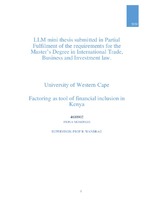| dc.description.abstract | A popular difficulty that all SMEs have had to face is limited access to finance. The fact that banks are not prepared to finance small businesses, has exacerbated the existing 'financing gap' in the small and medium-sized business which is already present in the SME industry. In an analysis of small and medium business are faced with a myriad of difficulties often as a result of restrictions in current collateral systems that do not offer a viable degree of risk mitigation due to ineffectual legislation, insufficient enforcement procedures, or an existing legal structure.1 All of these have therefore made factoring a great choice as far as SMEs go in all African countries that want to have access to financial services. Factoring is the service that, in order to provide the underlying credit sales of goods or services (known as a factor), is provided by a third-party. | en_US |

